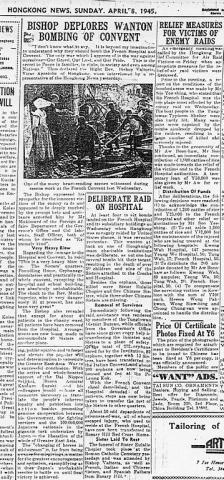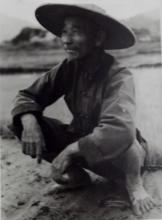70 years ago: Hong Kong's wartime diaries
4 Apr 1945, Barbara Anslow's diary
Submitted by Barbara Anslow on Thu, 2012-05-10 10:01Book / Document:Date(s) of events described:Wed, 4 Apr 1945Bombers came again at noon, all clear went just before 3pm so no show possible.
(It's said) two big fires were started - one big explosion South Bay way, and another Taikoo-way - oil fire it's thought. Saw the planes - large and glinting and silver.
Fritters tonight - nice.
Went to see June (Cheape) re german, and did half an hour for Olive at work while she had hair cut. Went to see Burgess in afternoon, and Pat C.
4 Apr 1945, WW2 Air Raids over Hong Kong
Submitted by Admin on Thu, 2014-02-27 01:24Book / Document:Date(s) of events described:Wed, 4 Apr 19454 Apr 1945, Chronology of Events Related to Stanley Civilian Internment Camp
Submitted by brian edgar on Tue, 2014-06-03 22:55Book / Document:Date(s) of events described:Wed, 4 Apr 1945There are almost no 'Europeans' left in town now, and it's the Chinese who are the unintended victims of the American bombing that's necessary to destroy the military and economic capacity of Japanese Hong Kong.
But today a bomb falls on the French Hospital in Causeway Bay and the popular Norwegian Pastor Neilson, who has a room on the top floor, loses everything to the resulting flames. Also destroyed are a set of accounts documenting in detail the loans raised for Selwyn Selwyn-Clarke's illegal by the bankers and others. These were given to Dr. Po-Chuen-Lai (who, along with Helen Ho continued Selwyn-Clarke's work after his arrest) and hidden in her room.
Désirée Gunderson, whose father is in Stanley, suffers a minor back wound, and she and her mother, Ruth Yvonne (née Baretto), are forced to seek new living quarters. Désirée is eventually sent to Macao on a junk, while her mother stays in occupied Hong Kong until the end, hearing the reading of the Imperial Rescript announcing the surrender outside the Gloucester Building on August 16.
The re-opening of the Hospital was announced on April 20th., although the Chinese school the Sisters had also been running remained closed at that date.
Sources:
Accounts: HKRS931 6-485 (Transportations)
Re-opening: Hong Kong News, April 20, 1945, p. 2
Neilson, Gundersons: Statement of Ruth Yvonne Gunderson, 10 - in HKPRO, HKMS100-1-6
04 Apr 1945, R. E. Jones Wartime diary
Submitted by Admin on Fri, 2015-04-03 11:24Book / Document:Date(s) of events described:Wed, 4 Apr 1945Plane over 4am & dropped bombs in N.Ts. Yesterday accounted for targets in Kowloon.
Fine & warm.
Heavy raids causing fires Kowloon & N.Ts 11.45-2pm.
3 papers in but no E. news therein.
Lorry with veg. 6.30pm.
04 Apr 1945, Harry Ching's wartime diary
Submitted by Admin on Sat, 2015-05-16 15:32Book / Document:Date(s) of events described:Wed, 4 Apr 1945To town. Alert while at Ken Chaun's ((the dentist)). They hear bomb scream for first time. Makes you feel ill. Bombs on Causeway Bay typhoon shelter, Wellington Barracks, Sikh temple and school, French Hospital hostel burned. Five nurses killed. 20 killed at Sikh temple. Debris all over Gap Road.
04 Apr 1945, Eric MacNider's wartime diary
Submitted by Admin on Wed, 2016-03-30 18:06Book / Document:Date(s) of events described:Wed, 4 Apr 1945Raid 11.45 am. Thick black smoke over HK.
French Hosp., Sikh Temple hit (4 nuns, 100 children killed)
04 Apr 1945, John Charter's wartime journal
Submitted by HK Bill on Tue, 2022-04-19 10:13Book / Document:Date(s) of events described:Wed, 4 Apr 1945Easter has gone: it was unmarked by anything worth mentioning except the weather has been simply heavenly – such a change from the bleak, grey winter. On the Wednesday I fell rather bilious and spent a couple of days more or less in bed. Both Y and I seemed to loose our appetites for a bit, which was really marvellous! It has enabled us to build up quite a reserve of rice flour which, now we are hungry again, as usual, we can now eat. In fact a touch of indigestion in this place is quite a Godsend!
April has arrived at last; the month of big events? The big conference of the allies at San Fransisco is scheduled for April 25th and a number of people (including Mr North) attach quite a lot of importance to the date. Russia may refuse to renew her pact of non-aggression with Japan, which is due for renewal by that date. With the British and American forces now well across the Rhine and advancing rapidly on Hamburg and Nurenburg it seems that the issue in Europe is settled and can only be a matter of time.
Goebells’ orders to all Nazi’s to remain in their respective areas and fight to the death shows what a ruthless grip the Nazi party has on Germany. It would seem that, after the attempt on Hitler’s life and the subsequent executions both of high ranking German army officers and members of the German aristocracy, that the Nazi Party still has undoubted control of Germany and is not at all afraid to use its power. In fact, by their system of Gestapo Police they remove and deal promptly with any anti-Nazi elements, thus making it impossible for any other party to be formed which might ask for terms, and so, if the Nazi’s decide to fight to the bitter end (as they seem to have done) then the fighting will continue until the greater part of Germany is occupied. To me, this seems a crime of the greatest magnitude that the Nazi’s are perpetrating against their own nation and countrymen. The thought of women and children being trained to assist in the defence of Berlin is too appalling. Poor things! I hope it will all end quickly.
In the meantime things are going ahead pretty rapidly in the Pacific war. With the new American bombardment of Shikoken Island it looks as though they mean to go straight for Japan and finish off the war there. On the other hand, three cruisers bombarded the Pratas islands, about 150 miles S. or S.E. of Hong Kong and for the last three days we have had very heavy air raids on HK, so it looks as though something may be about to happen here. The weather, as I have said, has been simply perfect, with excellent visibility.
They seemed to wait till Easter Sunday was over, for the first raid started at about 11.45 on Monday and lasted till about 2 o’clock or a little later, the ‘all clear’ being sounded at about 3.30. On Tuesday and today exactly the same thing happened. The American bombers are simply enormous. They are mostly B-24’s, the flying fortresses with their twin tail rudders, with a few B-29’s, the Super Fortresses with their single, very big rudder. I do not propose to know much about the shapes and appearences of these giant machines, but I am told that is one way of telling the difference and could just make out these details though the machines were very high – between 15,000 and 20,000 feet I should think. These flew chiefly in flights of 6, sometimes 4 and 3. It is difficult to say whether some of the flights circled around, dropping their bombs in two lots instead of just one, but I should say there were between 20 and 30 of these giants in each raid plus some fighter escort planes. When the sun caught them they looked very beautiful, like great silver birds floating slowly through the azure sky (although they would be doing about 300 mph). They dropped some tremendously heavy stuff – on Monday it seemed like the docks again, and Kai Tak; Tuesday it was much more distant and sounded as though the New Territories were having a plastering – probably the railway and military concentrations etc. Today it was nearer again and we saw huge columns of black smoke and yellowish grey smoke rising over the Stanley range of hills. The black smoke looks like an oil dump.
As far as we can see the local Japanese air unit of late has consisted of two small fighter planes, ‘The Flying Sampan’ (our pet name for a fair sized flying boat they have) and ‘Donald Duck’ (a sea plane). At all events, of late we have seen only two little fighters which do quite a bit of patrolling about here. In the Monday raid these two had ventured forth, though what they were supposed to be doing so low down when the bombers were at such a height, I do not know. I was looking over our verandah when I heard a plane rapidly approaching from the west, and a moment later one of these Jap planes came hurtling across our blocks, going at a good lick but with its engine making a very peculiar noise. As it was passing D’Aguila peninsula it emitted a stream of smoke from its exhaust and suddenly nose dived, wheeling slightly to the right as it went down behind the hill. I thought at first it had suddenly dived to attack something but my suggestion was somewhat ridiculed because the plane was already too low to start diving at that angle and because no American bomber was at all likely to be coming in just above sea level. In addition, people in the Indian blocks saw a cloud of smoke rise from behind the hill where the plane went down. So it is pretty certain that that poor chap crashed. People in Block 2 actually saw the dog fight which took place some distance off Stanley Bay. These two Jap planes were, apparently out after the Americans when about 5 American fighters suddenly swooped out of the sky onto them and riddled them with bullets. They say the other Jap plane tried to make off but also seemed to be badly hit and was loosing height; so that too was probably lost.
Some weeks ago two B-24’s were cruising about HK, very low. There was a launch off Stanley Bay towing a big lighter and one of the planes zoomed slowly down and raked the ships with her canon and the ships returned the fire. The plane then wheeled and dived again and dropped a bomb which hit the lighter right in the middle. The two ends lifted into the air, one sinking immediately and the other sinking a little more slowly.
On another occasion, one of the afore mentioned Jap fighters sailed boldly in to attack one of these giant fortresses, but the American just turned round and the Jap thought better of it and made off pronto.


